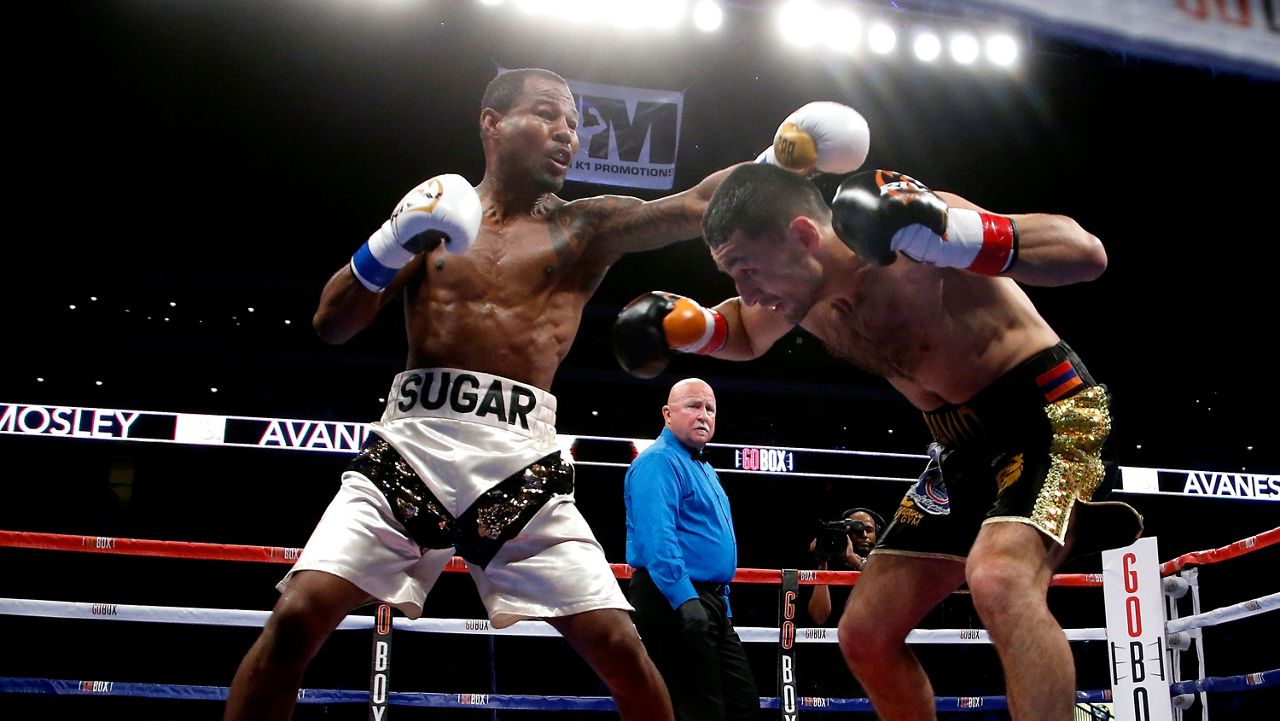LOS ANGELES (CNS) — A judge has finalized a judgment of more than $450,000 against former boxer Shane Mosley and a company he owned with his sister in litigation brought by a firm that hoped to use the retired fighter’s image in the promotion of a mixed martial arts event prior to the 2015 Super Bowl.
Los Angeles Superior Court Judge David Sotelo issued his order on Monday, for the most part reflecting a tentative statement of decision ruling he handed down on May 13.
Sotelo heard evidence beginning in 2021 in the nonjury trial of a countersuit brought by Swarm Entertainment LLC against Mosley; his sister, Cerena Mosley; and the company she owned and controls, Mosley Showdown Promotions.
“This court finds that when Shane falsely asserted that he had not consented to the use of his name and likeness, Shane intentionally interfered with the (agreement) between Mosley Showdown Promotions and Swarm, and with Swarm and the pay-per-view broadcaster,” the judge wrote.
During trial, Swarm executive Wayne Mogel testified that Mosley “has a huge fan base and we were hoping to capture that,” and he added that he considered the 50-year-old Mosley to have been, in his prime, one of the best boxers of his generation.
In his decision, Sotelo tentatively granted judgment against Mosley for $179,840. and against Mosley Promotions for $278,840., for a total of about $459,700. Swarm was awarded interest dating back to Jan. 30, 2015 but was denied punitive damages.
Cerena Mosley herself was found not liable, but the judge wrote that the boxer’s sibling was “intentionally lying about what consent she had and she obviously was negligent in misleading Swarm concerning Showdown’s authority to use her brother’s name and likeness.” The judge continued, “Maybe Cerena was simply hoping that Shane’s good-natured brotherliness would save her and Showdown, that Shane would see her facing possible legal trouble so he would come save her.”
In reality, neither Cerena nor Showdown had authority to allow the use of Shane’s name and likeness, but Swarm did not know this when they entered the agreement with Showdown was entered, according to Sotelo.
Mosley had started the litigation by suing Swarm in February 2016 for allegedly using his name and image to promote the event, dubbed “Super Brawl,” without his permission, but Sotelo dismissed Mosley’s complaint in 2018 after ruling that the boxer’s participation in a promotional video for the event demonstrated his consent.
Super Brawl was held at the Phoenix Zoo on Jan. 30, 2015, two days before Super Bowl XLIX in Glendale, Arizona, in which the New England Patriots defeated the Seattle Seahawks, 28-24. Swarm hoped to capitalize on the popularity of the Super Bowl and the large numbers of sports fans and celebrities who descend on the host city for the weekend.
Swarm intended that Super Brawl would be broadcast as a live, pay-per- view event, but since the company lacked experience in promoting MMA events, it entered an agreement with Mosley Promotions, which had experience putting together and promoting MMA fights, according to Mogel.
Mosley Promotions’ most important obligation was to ensure that the boxer appeared at Super Brawl and that he consented to Swarm’s use of his name and likeness to promote the event, Mogel said. Swarm would not have entered into the agreement with Mosley Promotions if Cerena Mosley had not promised that her brother would attend and allow his name and likeness to be used to promote the event, Mogel testified.
The most important promotional tool available to Swarm was to be a short video that would air on all of the pay-per-view providers in advance of the event, Mogel said. The video was taped at the Pomona home of Mosley’s father, Jack Mosley, in January 2015, according to Mogel.
In the video, Mosley states, “In a family tradition of world class combat sports — join us at the Phoenix Zoo for Super Brawl Showdown.”
One week before the event, Mosley allegedly contacted Swarm and for the first time, insisted he had never consented to the use of his name and likeness, prompting Swarm to pull its advertising for Super Brawl. As a result, no commercials were run on pay-per-view during the days before the event and viewers were unaware it was available for viewing, according to the countersuit.
“Shane’s lawyers threatened the pay-per-view broadcasters that he never consented to Swarm’s use of his name or likeness and that any promotion using of his name or likeness by the broadcasters would subject them to litigation,” the judge wrote, adding, “Shane’s decision to contact the pay- per-view providers directly was mean spirited and legally unjustified.”



